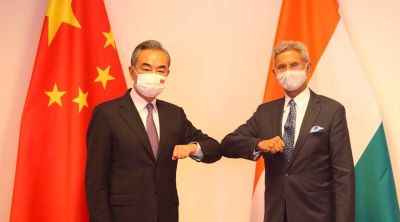Context-
Recent discussions have emerged regarding the potential for a thaw in India's strained relations with China. The idea of easing restrictions on Chinese foreign direct investment (FDI) marks a significant shift from India's long-standing policy that ties the state of border relations to overall diplomatic ties.
India’s Minister of External Affairs, S. Jaishankar, noted in a Geneva speech on September 12 that approximately 75% of “disengagement problems” with China have been addressed. However, he highlighted the critical concern of increased militarization along the border, suggesting that while some issues are being resolved, more substantial challenges persist.
Hours after Jaishankar's remarks, National Security Adviser Ajit Doval met with Wang Yi, a member of the Chinese Communist Party's Political Bureau, during the BRICS NSAs meeting in St. Petersburg. While both sides agreed to expedite efforts towards complete disengagement in contentious areas, there were no signs of breakthroughs in negotiations concerning the Depsang Plains and Demchok.
Restoration of Peace and Tranquility
● Uncertainty Surrounding Disengagement
The core question remains: what constitutes the restoration of peace and tranquility along the Line of Actual Control (LAC)? Following China's transgressions in 2020, the criteria for restoring the previous status quo seem ambiguous. India’s insistence on reverting to the status quo ante is notably absent from current discussions, with reports indicating that Indian border forces are still unable to access numerous patrolling points in Ladakh.
There is growing concern about whether India is prepared to accept the “new normal” that China has established along the border. The lack of clarity in disengagement terms and the evolving situation require careful deliberation from India, which must balance security and economic interests.
● Strategic Integration with China
Despite ongoing national security concerns, the Economic Survey 2024 suggests that India should integrate more deeply into China's supply chains through FDI. This view, supported by some economists, posits that engaging with Chinese investments could fill India’s investment gaps and strengthen its position in global supply chains.
However, the anticipated benefits of closer integration with Chinese supply chains remain dubious. Many commentaries overlook the complex dynamics of India-China relations and the imperative of economic de-risking from China.
Chinese Demands and Perspectives
● Track-1.5 and Track-2 Dialogues
Recent dialogues indicate that Chinese scholars acknowledge the changed status quo but expect India to accept these altered facts and move towards normalizing relations. They have outlined four specific demands: a level playing field for Chinese companies, visa facilitation, resumption of direct flights, and the establishment of a Chinese media presence in India.
In response, India has emphasized that these demands are merely symptoms of deeper issues that China needs to address first. The Indian delegation returned with a clear indication that China is unprepared to accommodate India’s concerns, particularly regarding the border and other structural challenges in their relationship.
The Chinese Economic Game Plan
Both China and the U.S.-led West are increasingly securitizing their economies. A report from the Rhodium Group highlights that India is emerging as a potential alternative investment destination to China, but this status could be jeopardized if India pursues closer ties with Chinese supply chains.
China’s focus remains on dominating future industries, particularly in critical sectors such as electric vehicles and solar equipment. Their strategy involves maximizing domestic value chains, which could exacerbate tensions with both advanced and emerging economies like India.
Impediments in Bilateral Trade
India's substantial trade deficit with China has continued to grow, surpassing $105 billion in 2023. Despite some calls for increased FDI, the reality is that Indian exports to China have decreased, further entrenching economic vulnerabilities.
China has shown little inclination to address longstanding issues regarding India’s access to its markets. Instead, the Chinese have consistently pointed to their own economic policies while ignoring India's pressing concerns.
Strategic Implications for India
● Need for a Differentiated Policy
Given the complexities of the relationship, India must adopt a nuanced approach to its economic interactions with China. While complete decoupling is unrealistic, India should selectively allow Chinese FDI in sectors aligned with its manufacturing strengths and national security interests.
● Learning from Global Experiences
Evidence from other regions shows that substantial Chinese investments often lead to increased imports from China, counteracting any intended benefits. For example, ASEAN's imports from China surged despite receiving significant Chinese investments, illustrating the potential pitfalls of deeper economic ties.
India stands at a crossroads in its relations with China. The prospect of easing restrictions on Chinese FDI must be weighed against the strategic, security, and economic implications of such a move. A carefully crafted policy that considers both national security and economic interests will be crucial for India as it navigates this complex landscape. The ultimate goal should be to enhance India's position in the global economy while safeguarding its strategic interests against the backdrop of an assertive China.
|
Probable Questions for UPSC Mains Exam- 1. What are the key implications of India's potential shift towards easing restrictions on Chinese foreign direct investment, especially in the context of national security concerns along the border? (10 Marks, 150 Words) 2. How does China's economic strategy and its demands for greater integration affect India's approach to engaging with Chinese supply chains and addressing the ongoing trade deficit? (15 Marks. 250 Words) |







